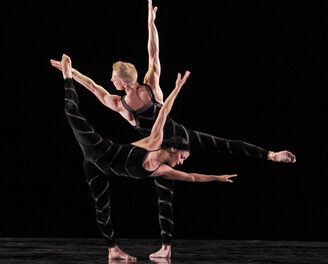On Friday night, fifty people braved a cold and rainy night to fill the pews of the First Presbyterian Church in downtown Asheville. The church’s Gothic-style interior and subdued lighting provided a tasteful backdrop for a debut performance by the Brevard Woodwind Quintet (flutist Leonard Lopatin, oboist Andrew Parker, clarinetist Steve Loew, bassoonist Will Peebles, and French horn player Hobart Whitman). The ensemble was hosted by Amici Music, directed by the entertaining and talented Daniel Weiser. Weiser prefaced the performance with an informative history lesson on the evolution of the woodwind quintet from the mid-18th century to the present day. This overview was capped off with humorous quotes by notable historical figures on each of the woodwind instruments.
The program began with Franz Danzi’s Woodwind Quintet in G minor, Opus 56, No. 2. In the opening movement, the ensemble maintained impeccable rhythmic clarity; the frequent call-and-response between each performer in the woodwind choir was well-balanced, each instrument’s melodic interjection clearly heard. Peebles’ agility with the rapid melodic sequences and Whitman’s dynamic control were especially impressive. The distinctive sonic quality of each instrument was beautifully highlighted in the second movement. Loew and Peebles did an especially fine job providing the accompanying harmony. Lopatin and Parker, while highly expressive, were at times overpowering in the overall texture. However, by the third movement the ensemble as a whole reached agreement on dynamic blend, and performed the spritely rhythms with a playful bounce. The fourth movement provided an energetic conclusion that showcased the manual dexterity of each musician.
Following Weiser’s humorous interlude about the clarinet, the quintet performed Jacques Ibert’s Trois Pièces Brèves. The jocund, swinging rhythms of the first movement were well-executed by all the performers, creating a sonic dance for the audience’s ears. Lopatin and Loew played the lyrical counterpoint of the second movement with soaring command, their duet a sonorous dialogue. The quintet expertly navigated through the chromatic harmonies and frequent modulations of the third movement with superb intonation and sensitive ensembleship.
The program continued with Malcolm Arnold’s Three Shanties for Wind Quintet. The quintet remained tightly synchronized through Arnold’s syncopated rhythms and dissonant harmonies, while capturing the composer’s intent to musically portray a drunken sailor. Part of the way through this movement, the “Habanera” quote from Bizet’s opera – played with humorous panache by Peebles – elicited several chuckles from the audience. In the second movement, Peebles uncannily mimicked the sound of a foghorn on his bassoon, while Lopatin, Parker, and Whitman all played solos with delicate finesse. The third movement, Arnold’s version of an Irish reel, provided many opportunities for the five musicians to demonstrate a wide range of timbre combinations possible in a woodwind quintet. The interjections of “Yo Ho Blow the Man Down” were played with soloistic vivacity by each performer.
The first half of the program concluded with Arthur Frackenpohl’s arrangement of Scott Joplin’s rag, “The Cascades.” The quintet did a fine job capturing the march-like rhythm and turn-of-the-century syncopations of a work originally written for piano.
Following intermission, Weiser joined the quintet on piano for a performance of Ludwig Thuille’s Sextet for Piano and Woodwind Quintet. Op. 6. The opening movement featured solo interludes for Whitman, Loew, and Lopatin. The flowing rhythms of Weiser’s accompaniment provided a gorgeous bed of sound for the quintet’s sonorous melodies. Weiser demonstrated sensitivity and a graceful touch as an accompanist, while also demonstrating a powerful presence in sections that featured the piano as a solo voice within the ensemble.
The second movement featured various combinations of woodwind instruments, acting as smaller consorts within the chamber ensemble. This orchestration by Thuille gives the chamber work a more symphonic quality. The third movement, a playful gavotte, provided multiple opportunities to showcase the technical prowess of each of the five woodwind performers. Parker’s and Lopatin’s jubilant intensity and well-crafted upper register sound provided a brilliant sparkle at significant cadences. The energy continued into the final movement, as each performer injected an adventurous spirit into the finale’s rapidly pervasive ternary rhythms. The excitement was maintained in the contrasting sustained passages, while providing a dramatic texture change.
A wonderful showcase for each performer’s expertly-honed skill, the finale provided a rousing conclusion to an excellent evening of music. This reviewer hopes that this debut performance will be the first of many for this exceptional new chamber ensemble.
The Brevard Woodwind Quintet will repeat “Winds of Winter” on Saturday at All Souls Cathedral at Biltmore Village and Sunday afternoon at White Horse Black Mountain. See our sidebar for details.











